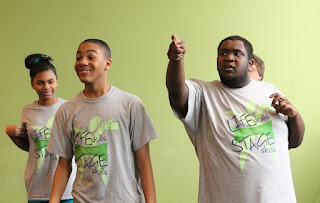Next Steps and New Findings
By Susie Robinson
In our sixth year of Next Steps programming, First Stage sought to implement a formal
evaluation of Next Steps to identify the program’s impact and to inform the program’s
growth and future. Thanks to the Stackner Family Foundation’s generous support
last season, First Stage was able to do just that.
With the
guidance of Derute Consulting Cooperative, First Stage created a formal participatory
evaluation of Next Steps. The evaluation was a fully participatory process and
evolved through the collaborative dialogue and decision-making of the Derute
consultants, Dr. Elizabeth Drame and Mary Stone, and the Next Steps Academy
Director, Brenna Kempf. Evaluation activities took place throughout five phases
over the past year.
 |
Retrospective data and the Spring Break pilot evaluation
provided the team with an abundance of information. From their findings, they
made modifications to the Next Steps program and evaluation materials with a
deeper understanding of our students. They focused on enhancing the positivity
that Next Steps brings, introduced thorough and thoughtful lesson planning
templates, and restructured how they would assess our Next Steps students. In
all the team’s redesign choices, they prioritized meeting students where they
are.
For new students, it was important to capture the change (decrease
or growth) in life skills as they participated in Next Steps for the first
time. For returning students who already have a foundation of the life skills,
highlighting the maintenance—in addition to the growth—was imperative;
consistency, regulation, and maintenance are learned skills for the Next Steps students.
Presence and further development for the returning students was a sign of
success.
The summer evaluation
demonstrated the following statistics:
·
71% of new students grew in their engagement (participation and confidence)
·
71% of new students grew in their expression (communication, emotion
recognition/expression and empathy)
·
89% of returning students grew or maintained their engagement (participation and confidence)
·
100% of returning students grew or maintained their expression (communication, emotion
recognition/expression and empathy)
 |
The numbers from this summer are worthy of celebration, yet they
cannot capture the value and depth of the individual students and their
triumphant accomplishments. Some of the
most compelling classroom stories and parent testimonials of students’ life
skill development in engagement and expression are as follows:
Engagement
“He looks forward to coming each day and participating… he can
come to a place where he is accepted and valued.” - Returning Parent
“...The best part of the presentation was when Anton, who
refused to dance all week long, did all of the choreography upstage of the
cast.” - Lead
Teacher
“Seeing [her] confidence… She looked relaxed and was welcomed
and accepted for who she is. [She] was noticed!” - New Parent
Expression
A younger
two-week student developed calm and articulate communication for discussing her
needs throughout her time in the session. By the end of the week, she wasn’t
having as many loud outbursts when she was bothered. During a break in the
quiet room, when asked if she was ready to go back to class, she calmly
responded, “I’m still not regulated.”
“He told
me that he was nervous today—when in the past would have held that in until he
had a meltdown!!” - New Parent
There are
countless more stories of students lending a hand, giving a hug, sharing a
fidget toy, initiating a compromise, and being a friend. Friendships and
connections blossomed throughout the two weeks, and many students took
initiative to keep friendships alive; they connected their parents and asked
about playdates, exchanging phone numbers, and following each other on YouTube
and Instagram. Every Next Steps teaching artist provided an equal effort to
foster both life skills and stage skills in each individual student. The Next
Steps final presentations concluded with acknowledgements, smiles, hugs, and a
stress-free atmosphere. It was a wonderful, enriching experience for all.
Keeping the
goal of growth in students’ life skills at the forefront of the preparation and
execution of the evaluation and program led to a successful session this past
summer and has laid the groundwork for a bright future.
First Stage
plans to implement this evaluation of the Next Steps program every three years.











No comments:
Post a Comment